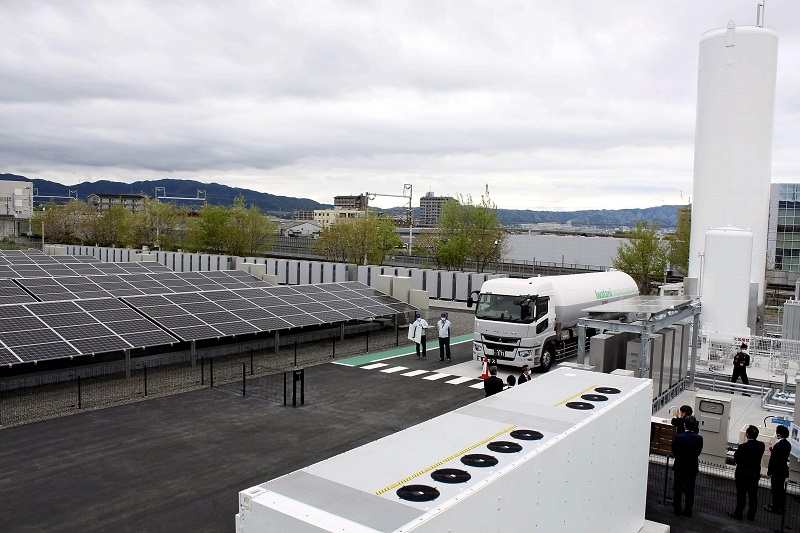
Panasonic Corp.’s power generation system combining solar panels and storage batteries in Kusatsu, Shiga prefecture, in April.
6:00 JST, September 14, 2022
The government has set a target of training 30,000 workers for storage battery-related industries and will support moves to secure sufficient supplies of minerals such as lithium to meet the demand for battery production, which is forecast to surge in the years ahead.
The Economy, Trade and Industry Ministry included these objectives in a strategy compiled on August 31 that aims to achieve a domestic battery production capacity of 150 gigawatt hours (GWh) by 2030. The ministry also laid out an annual global production target for Japanese manufacturers of 600 GWh worth of batteries by that year — a more than 20-fold increase from the 2020 level.
Through achieving these targets the government hopes to maintain Japanese manufacturers’ share of about 20% of the global market.
A total of 30,000 additional workers in related industries will be required to reach these goals, including 18,000 in manufacturing and 4,000 in technology development and other fields. It is estimated that about 4,000 to 5,000 workers are currently engaged in manufacturing- and development-related jobs.
Human resource development will be a joint effort involving government, industry and the education sector, and will be focused in the Kansai region, where battery-related industries are concentrated. Industrial circles, universities, technical colleges and technical high schools will work together to craft education programs to train these workers. The government hopes to have the programs rolled out in the 2024 school year.
As Japan is reliant on imports for minerals essential for battery production such as lithium and nickel, the government will provide generous guarantees and support to secure the interests of Japanese companies seeking to obtain these minerals. The ministry indicated that a domestic battery production capacity of 150 GWh would require 100,000 tons of lithium annually and 90,000 tons of nickel. The government will also promote the development of recycling technologies as it seeks to encourage the manufacture of high value-added batteries.
Economy, Trade and Industry Minister Yasutoshi Nishimura indicated he wanted the public and private sectors to work closely together on this initiative.
“The government will take the lead in implementing this strategy, but we can’t succeed without the efforts of the private sector,” Nishimura said at a meeting on August 31.
Storage batteries are vital for electric vehicles and for the wider use of renewable energy sources, such as electricity generated through solar and wind power. The global market for these batteries is forecast to reach ¥40 trillion in 2030, an eightfold increase from 2019.
Top Articles in Business
-

Prudential Life Insurance Plans to Fully Compensate for Damages Caused by Fraudulent Actions Without Waiting for Third-Party Committee Review
-

Narita Airport, Startup in Japan Demonstrate Machine to Compress Clothes for Tourists to Prevent People from Abandoning Suitcases
-

Japan, U.S. Name 3 Inaugural Investment Projects; Reached Agreement After Considerable Difficulty
-

Toyota Motor Group Firm to Sell Clean Energy Greenhouses for Strawberries
-

SoftBank Launches AI Service for Call Centers That Converts Harsh Customer Voices into Softer Voices
JN ACCESS RANKING
-

Japan PM Takaichi’s Cabinet Resigns en Masse
-

Japan Institute to Use Domestic Commercial Optical Lattice Clock to Set Japan Standard Time
-

Israeli Ambassador to Japan Speaks about Japan’s Role in the Reconstruction of Gaza
-

Man Infected with Measles Reportedly Dined at Restaurant in Tokyo Station
-

Videos Plagiarized, Reposted with False Subtitles Claiming ‘Ryukyu Belongs to China’; Anti-China False Information Also Posted in Japan




















